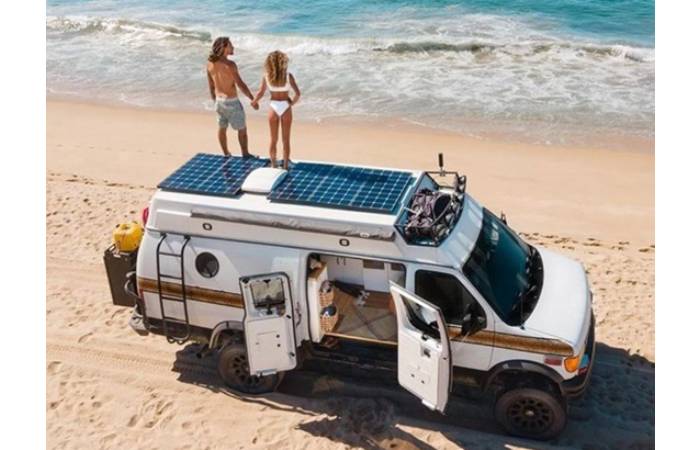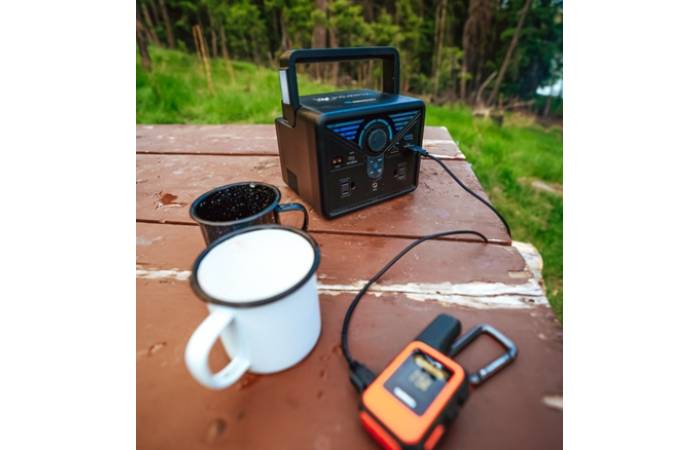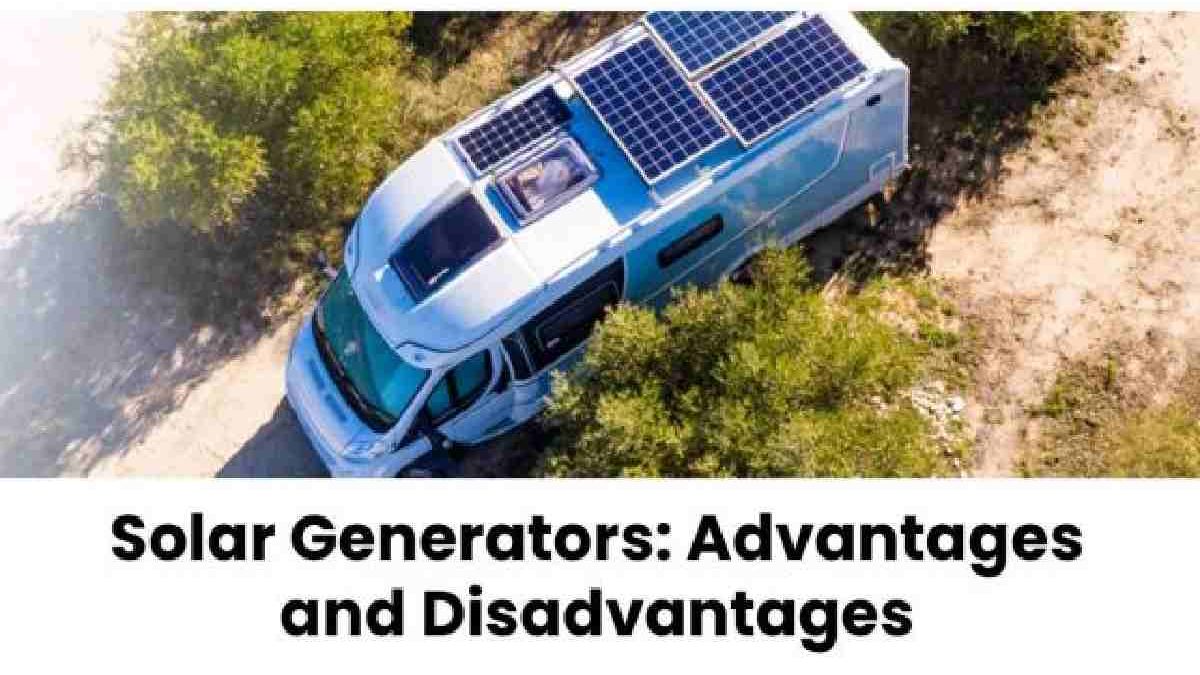Should I get a portable solar generator? If this is the question that is on your mind, you have come to the right place. In this article we explain what it is, how it works and the advantages and disadvantages of solar generators. Keep reading and in just over 3 minutes you will have your answer.
Table of Contents
What is a solar generator?
A solar generator is exactly the same as a conventional generator, that is, a portable electrical power system. The difference? The origin of this energy is that solar generators use, instead of gasoline or diesel, solar panels to capture energy from the sun, energy that is then stored in a battery so that it is available when needed, such as in the case of a blackout or if you are in a place without access to the electrical network (mountain, boat, etc.)
It is necessary that you take into account a consideration that may seem obvious but is important: a solar generator does not “generate” energy -as gasoline generators do- but it stores it previously and then makes it available to you. This consideration is important because this type of device has its advantages but also its drawbacks, as we will see below.
Elements of a solar generator
You can think of a solar generator as a tiny photovoltaic installation, since these devices have the same elements as a typical solar panel installation. In this way, a generator contains a battery -usually lithium or AGM or gel type in economical models- an inverter charger to convert direct current into alternating current (which is what our electrical appliances use), charge regulator, battery monitor, wiring and, of course, solar panels. Few generator models are marketed as an all-inclusive package, while others give you the opportunity to buy some components – usually the plates or battery but also other components such as a wheel system for transporting it – separately.
Of course, when we talk about battery, inverter, solar panels… We are not talking about the same type of components as those of a typical home photovoltaic installation. Solar panels on a generator – if you have more than one – are usually smaller, lower voltage and much more portable. Remember that a generator is designed to move and a rooftop installation is not. In the same way, the storage battery is also smaller and more portable, and usually offers you USB inputs, as well as 12 or even 220 volt plugs.
Important: make sure that both the volume of the battery and the power of the inverter and the watts offered by the device will be enough for the devices you want to power with your generator. The 3000 watt inverter can basically meet the working power of most household appliances in daily life, which may be just what you need.
It is not uncommon to find all kinds of web pages and videos on the Internet about how to make your own solar generator. You know what happens in these cases: imagination to power. For our part, we always recommend that you go to a professional to avoid disappointment.

Solar generators vs. fuel generators
Solar generators offer incredible versatility. They will give you an optimal response if you travel in a caravan, on a boat, if you are camping or even in the event of an eventuality in your weekend home or on your farm as long as you do not connect high consumption appliances. Of course, if your idea is to have a backup system for your home or for the use of large devices, it may fall short. The best advice: always calculate your energy needs before purchasing a generator. With the solar power calculator, you can easily estimate how many solar panels and solar cells you need to buy based on the power and duration of electrical appliances in your home.
Let’s take a look at the advantages and disadvantages of solar generators compared to conventional fuel generators:
Advantage 1: free energy
It happens every time you buy a photovoltaic device, be it an installation of solar panels for a large company or a simple mini solar charger for your mobile: from the moment you start using it, the energy you get is energy you no longer pay for . Solar generators are no exception. By feeding on the sun’s energy, they save you having to spend money on fuel (gasoline, diesel) during the 25-30 year useful life of the solar panels.
Advantage 2: clean energy. silent energy
Photovoltaic energy is 100% clean energy. No fumes and no polluting CO2 emissions. So simple and so different from conventional generators. As if this were not enough, solar generators are incredibly quieter than conventional ones. If you need your generator to do projects –eg. of video- outdoors or simply to take it with you in your caravan on a relaxing vacation, this is your option, there is no doubt.
Important questions before buying a solar generator:
What is the capacity of the generator battery?
What kind of appliances (voltage) will I be able to power with it?
Do I have a place to put it?
How much does it weigh? Will I need some kind of trailer to move it?
Advantage 3: low maintenance and safety
Solar generators don’t have moving parts, lots of wires, and don’t use liquid fuel. The result is practically non-existent maintenance and considerable safety against possible fires or accidents that can occur when using conventional generators.
Advantage 4: initial investment
Your solar generator is likely to be more expensive than conventional generators and this can be a problem for you. In any case, don’t let the worry of having to pay a few hundred dollars extra to buy your generator make you forget that, once amortized, your device will offer you its services without having to pay for them again. Remember: the energy you get from the sun is energy you don’t pay for. Seen in the medium-long term, your solar generator will always be much more profitable than a conventional one that you have to feed with fuel throughout its useful life.

Disadvantage 1: limited capacity
We have already discussed it before. If you are looking for a source of energy to power some household appliances in case of need, a solar generator will fulfill your mission. If what you have in mind is backup equipment for your home or to power high-consumption equipment – let’s not say industrial equipment – the most recommended option is not a solar generator. Simply: its capacity will be exhausted in a very short time.
Disadvantage 2: slow recharging and dependence on the sun
A conventional generator will offer you electricity continuously as long as you continue to feed it with fuel. This does not happen with solar generators that, at a certain point, need to be recharged. That recharging not only takes some time, but also has to be done during the day and whenever there is enough sunlight. If you are going to be in a hurry, the solar generator will probably not be your best option.
Should you then get a solar generator?
If you’ve read carefully, you probably already have your answer: it depends. If you move around a lot in your caravan, on a boat, etc. And need an extra source of electricity that is clean, quiet, easy to operate and uncomplicated, a solar generator is the answer to your prayers. You need to buy dedicated solar panels for campers depending on the space on your roof. But be careful, because its limited capacity added to the slowness of its recharge -and the need for a sunny day to do so- limits its possibilities as a backup unit in homes, industry or for large consumption devices.

